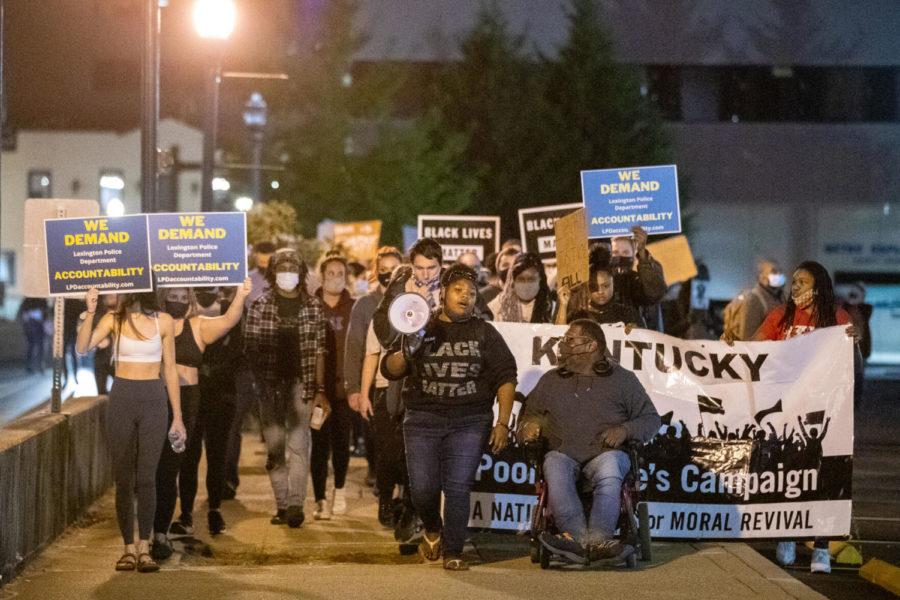UK students react to guilty verdict in trial of Derek Chauvin, cop who killed George Floyd
Protesters march down the sidewalk during a protest in response to the grand jury decision on the Breonna Taylor case on Wednesday, Sept. 23, 2020, in Lexington, Kentucky. Photo by Michael Clubb | Staff
April 20, 2021
After seven weeks of jury selection, oral arguments, testimony and deliberation, former Minneapolis police officer Derek Chauvin was charged with the murder of George Floyd, a Black man, in a Hennepin County criminal court Tuesday afternoon. He faced three charges—second-degree unintentional murder, third-degree murder and second-degree manslaughter—for all of which he was found guilty by the jury.
The verdict is a culmination of a year of unrest, protest, and calls for systemic change within law enforcement systems in the United States that began on May 25, 2020, when Floyd’s nine-and-a-half-minute death pinned down by multiple white police officers was caught on video. Floyd’s murder reignited a movement focused on addressing the racial discrimination Black individuals often face when dealing with law enforcement in America, sometimes to such tragic ends as Floyd Breonna Taylor, Ahmaud Arbery, Daunte Wright and many more.
UK junior and biology major Cole Railey felt anxious and joyous, most mostly relieved upon hearing the verdict. He said he agreed with the jury’s decision: “It’s kinda hard not to in my opinion.”
Railey said that he believes Chauvin was rightfully held accountable for his use of excessive force against Floyd. He kept up with the trial, feeling a responsibility to remain informed, and said that the verdict, reached nearly a year after Floyd’s death and after months of relentless protest, shows that change is possible.
“Right now, I think it means that first step towards a new America, a more inclusive, understanding, competent America,” Railey said. “That first step towards that change that a lot of us want.”
Judge Peter Cahill will oversee Chauvin’s sentencing hearing in eight weeks, where prosecutors from the Minnesota Attorney General’s Office will argue for a sentence above the recommended 12.5 year prison sentence for second-degree unintentional murder and third-degree murder for someone with no prior criminal history under Minnesota sentencing guidelines on the basis of “aggravating factors,” according to the Minneapolis Star Tribune. They will argue that Floyd, who told officers he couldn’t breathe and became unresponsive when his pulse stopped several minutes after being pinned to the ground with handcuffs behind him, was subject to “particular cruelty” by officers abusing their authority and acting as a group in front of children as young as 9 years old.
The other three former officers of the Minnesota Police Department who held Floyd down—J. Alexander Kueng, Thomas Lane and Tou Thao—will stand for trial in August on charges of aiding and abetting second-degree unintentional murder and manslaughter.
Jury members had to consider the cause of Floyd’s death and state law pertaining to certain rights of force granted to police officers in their deliberation. For the second-degree unintentional murder charge, they had to decide whether Chauvin caused Floyd’s death beyond a reasonable doubt; they didn’t have to determine whether Chauvin intended to kill Floyd, but rather whether he intended to commit another felony—third-degree assault in this case—which resulted in Floyd’s death. They also had to decide whether Chauvin’s use of force was “reasonable” or “unreasonable,” considering his police training. Hennepin County Chief Medical Examiner Dr. Andrew Baker testified that Floyd died from cardiac arrest, arising from both asphyxiation—strangulation— by law enforcement and pre-existing health concerns.
For the third-degree murder charge, the jury decided that Chauvin caused Floyd’s death by acting in a way that was “eminently dangerous to others and evincing a depraved mind, without regard for human life.”
UK freshman and pre-nursing student Seyi Botu said that she was glad Chauvin was found guilty, but that America still has a long way to go.
“There are still Black people being murdered for no reason on camera and the murderers are here walking free,” Botu said.
She added that the impact of the verdict will have on UK students is unclear, since she doesn’t think many UK students really cared about or followed the trial.
President Eli Capilouto and Kirsten Turner, vice president for student success, sent emails to the UK community regarding the verdict. Turner advertised free counseling in the Martin Luther King Jr. Center from 5:30-7:30 p.m. Tuesday evening as well as opportunities for Zoom counseling. Capilouto also included links to wellness resources for students and employees, in addition to stressing the need to learn from and listen to each other with respect, compassion and understanding to make the UK community and world a better place.
“That’s what we bring to these issues: people committed to the power of ideas to create change in hearts and minds; to force reforms in policies and programs; and to create spaces for all people to debate and encourage, dream and aspire,” he wrote.
Sophomore clinical leadership and management major Payton Foreman hopes that the verdict can jumpstart change within law enforcement and the UK community. While justice was served, she thinks more needs to be done.
“I hope that UK students will start to maybe push more for Breonna Taylor because I know she went to UK, and nothing has happened to the police that shot her,” Foreman said. “So I hope that maybe they’ll start to speak out more and use this as an example.”
































































































































































